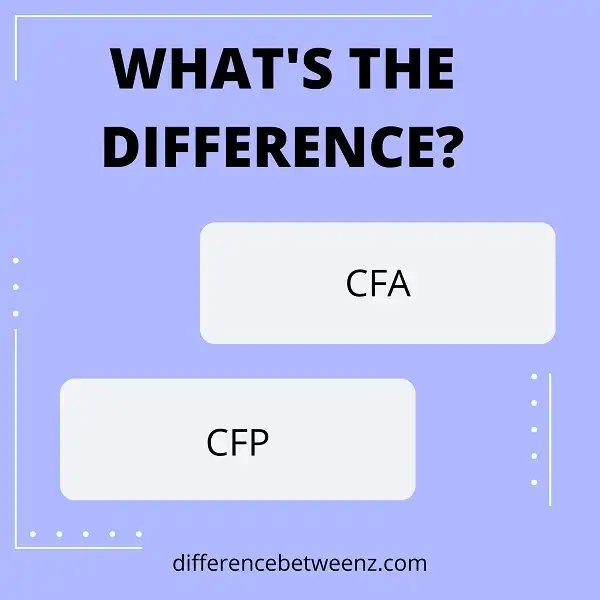Are you considering a career in finance? Do you know the difference between a CFA and a CFP? A Certified Financial Planner (CFP) is an individual who has completed specific coursework and passed an exam in financial planning. A Chartered Financial Analyst (CFA) is an individual who has completed specific coursework and passed an exam in financial analysis. This blog post will compare and contrast the two certifications so that you can make an informed decision about which one is best for you. We’ll discuss the benefits of each certification, as well as the necessary qualifications to obtain them.
What is CFA?
CFA is an abbreviation for the Chartered Financial Analyst designation. It is a professional credential granted by the CFA Institute, an international organization that sets standards for the financial analysis profession. CFA candidates must pass three exams, which cover topics such as ethical and professional standards, quantitative methods, economics, financial reporting and analysis, corporate finance, equity valuation, fixed income securities, portfolio management, and derivative instruments. The CFA designation is considered to be one of the most prestigious credentials in the financial industry, and CFA holders are highly sought-after by employers. CFA candidates typically have several years of experience working in the financial industry before sitting for the exams.
What is CFP?
CFP stands for “certified financial planner.” It is a designation granted by the Certified Financial Planner Board of Standards, Inc. to those individuals who meet certain educational and experience requirements and who pass an exam. CFP professionals are required to uphold high ethical standards and provide comprehensive financial planning services to their clients. The CFP credential is recognized as the highest standard in the financial planning industry. CFP professionals are held to a fiduciary standard, which means that they must always act in their clients’ best interests. CFP professionals can work as financial planners, investment advisers, insurance agents, and tax preparers, among other things. If you are looking for comprehensive financial planning services, be sure to ask if your advisor is a CFP professional.
Difference between CFA and CFP
CFP and CFA are both professional designations in the financial industry. CFP stands for Certified Financial Planner, while CFA stands for Chartered Financial Analyst. Both designations require passing an exam, but the CFP is focused on financial planning and counseling, while the CFA is focused on investment management and analysis. In order to become a CFP, candidates must also have at least three years of professional experience in financial planning. The CFA designation is offered by the CFA Institute, while the CFP is offered by the Certified Financial Planner Board of Standards. There are currently over 150,000 CFPs and over 100,000 CFAs in the United States.
Conclusion
The Certified Financial Analyst (CFA) designation is one of the most respected and sought-after designations in finance. CFA charter holders are considered to be some of the most knowledgeable and well-rounded financial professionals in the world. However, there are other professional designations that can also offer a great deal of value to those working in finance, such as the Certified Financial Planner (CFP) certification. Let’s take a look at some of the key differences between these two designations. The CFA designation focuses on investment analysis and portfolio management, while the CFP certification covers all aspects of personal financial planning, including risk assessment, retirement planning, estate planning, and more.


